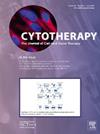在一个2升的搅拌槽生物反应器中,采用灌注动力生产超过100剂CAR-T,并实现产品的自动收获、洗涤和浓缩
IF 3.7
3区 医学
Q2 BIOTECHNOLOGY & APPLIED MICROBIOLOGY
引用次数: 0
摘要
背景,同种异体CAR-T疗法提供了大规模生产“现成”剂量的潜力,解决了批准的自体产品生产过程漫长的局限性。为了实现这一潜力,需要工业上可扩展的上游和下游工作流程。为此,我们在一个2升的搅拌槽生物反应器(STR)中描述了CAR-T细胞灌注制造过程,并使用一种解决方案来自动化生物反应器收获、最终产品洗涤和浓缩步骤。方法健康供体来源的抗cd19 CAR-T细胞在Ambr®250高通量灌注和Univessel®2升一次性STR中平行培养,后者与XCell ATF®2细胞保留装置偶联。CAR-T细胞在4Cell®nutrit无血清培养基中扩增,灌注7天,并根据G-Rex®24孔板工艺对性能进行基准测试。Ksep®400作为封闭的自动化解决方案进行评估,用于从2L STR中收集、浓缩和洗涤最终的CAR-T产物。研究了250mL和2L系统之间的可比性,以及自动收集对细胞产量、活力、激活、成熟、衰竭、细胞毒性和细胞因子释放的影响。结果在250mL和2L STRs中,car - t细胞成功扩增~ 125倍。在2L规模下,总活细胞的最终产量持续达到约500亿个,CAR转导效率为34%,相当于100多个代表性剂量的150 × 106个CAR+ T细胞。收获的细胞主要属于原始记忆和中枢记忆子集(95%),表达可忽略不计的衰竭标记(1%)。250mL和2L生物反应器在CAR-T细胞产量、活力、表面标记物表达或细胞毒性方面均无统计学差异。自动收获回收了总产量的90%,细胞浓缩了8倍,并且对收获后的CAR-T细胞表型、细胞毒性或生长动力学没有影响。结论这些发现证明了在灌注型搅拌槽生物反应器中,将功能性CAR-T细胞进行多升扩增以产生数百个剂量的可行性。Ambr®250有效地充当了缩小模型,并实现了无缝放大至2L。最后,自动化的收获和浓缩简化了下游工作流程,同时保持了CAR-T细胞的质量。这种可扩展的上游和下游工作流程非常适合未来同种异体疗法的大规模生产。本文章由计算机程序翻译,如有差异,请以英文原文为准。
Perfusion-powered production of over 100 CAR-T doses in a 2-litre stirred-tank bioreactor with automated product harvest, wash and concentration
Background & Aim
Allogeneic CAR-T therapies offer the potential to mass produce "off-the-shelf" doses, addressing the limitations of lengthy manufacturing processes in approved autologous products. To realise this potential, industrially scalable upstream and downstream workflows are required. To this end, we characterised a CAR-T cell perfusion manufacturing process in a 2-litre stirred-tank bioreactor (STR), with a solution to automate the bioreactor harvest, final product wash, and concentration steps.
Methodology
Healthy donor-derived anti-CD19 CAR-T cells were cultured in parallel in the Ambr® 250 High Throughput Perfusion and Univessel® 2-litre single-use STR, the latter coupled with the XCell ATF® 2 cell retention device. CAR-T cells were expanded in 4Cell® Nutri-T serum-free medium in perfusion for seven days, and performance was benchmarked against a G-Rex® 24 well plate process. The Ksep® 400 was evaluated as a closed, automated solution for the harvesting, concentration, and washing of the final CAR-T product from the 2L STR. Comparability between the 250mL and 2L systems was examined, alongside the impact of automated harvesting on cell yield, viability, activation, maturation, exhaustion, cytotoxicity, and cytokine release.
Results
CAR-T cells were successfully expanded ∼125-fold in perfusion in both 250mL and 2L STRs. At the 2L scale, final yields of ∼50 billion total viable cells were consistently generated, with a CAR transduction efficiency of 34%, corresponding to over 100 representative doses of 150 × 106 CAR+ T cells. Harvested cells were predominantly in the naive and central memory subset (>95%) and expressed negligible levels of exhaustion markers (<1%). No statistical differences were observed in CAR-T cell yield, viability, surface marker expression, or cytotoxicity between the 250mL and 2L bioreactors. Automated harvesting recovered >90% of the total yields, concentrated cells 8-fold, and had no impact on CAR-T cell phenotype, cytotoxicity, or growth kinetics post-harvest.
Conclusion
These findings demonstrate the feasibility of multi-litre expansion of functional CAR-T cells to generate hundreds of doses in perfusion-based stirred-tank bioreactors. The Ambr® 250 effectively served as a scaled-down model and facilitated seamless scale-up to 2L. Finally, automated harvesting and concentration streamlined the downstream workflow while maintaining CAR-T cell quality. This scalable upstream and downstream workflow is ideally suited for mass production of future allogeneic therapies.
求助全文
通过发布文献求助,成功后即可免费获取论文全文。
去求助
来源期刊

Cytotherapy
医学-生物工程与应用微生物
CiteScore
6.30
自引率
4.40%
发文量
683
审稿时长
49 days
期刊介绍:
The journal brings readers the latest developments in the fast moving field of cellular therapy in man. This includes cell therapy for cancer, immune disorders, inherited diseases, tissue repair and regenerative medicine. The journal covers the science, translational development and treatment with variety of cell types including hematopoietic stem cells, immune cells (dendritic cells, NK, cells, T cells, antigen presenting cells) mesenchymal stromal cells, adipose cells, nerve, muscle, vascular and endothelial cells, and induced pluripotential stem cells. We also welcome manuscripts on subcellular derivatives such as exosomes. A specific focus is on translational research that brings cell therapy to the clinic. Cytotherapy publishes original papers, reviews, position papers editorials, commentaries and letters to the editor. We welcome "Protocols in Cytotherapy" bringing standard operating procedure for production specific cell types for clinical use within the reach of the readership.
 求助内容:
求助内容: 应助结果提醒方式:
应助结果提醒方式:


